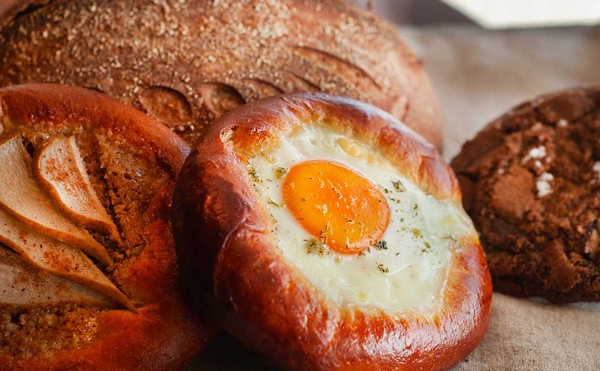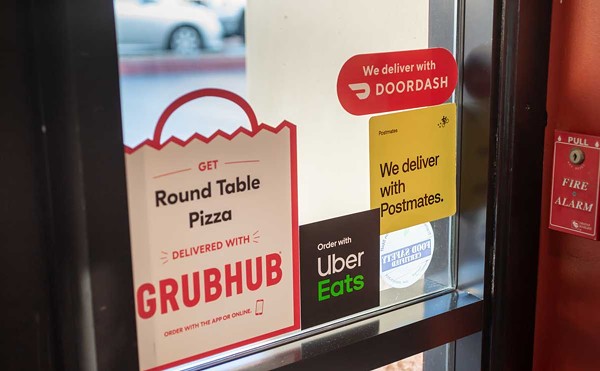Few cuisines are as misunderstood in metro Detroit as Middle Eastern. The average non-Arab diner might imagine it as a monolithic cuisine, with people wolfing down fattoush salads and gnawing on falafel sandwiches from Tunisia to Turkey to Turkmenistan. It's more accurate to say "Arabic food" is actually a family of many different cuisines, from the Berber dishes of Northwest Africa to the stews and grilled meats of the Arabian Peninsula and beyond. Among the many nations packed in and around the Fertile Crescent, there are foods as varied as those of Europe, though the limited menus in many of our local eateries don't offer much in the way of proof.
Among these many national cuisines, Lebanese fare is special. It's Middle Eastern food, yes, but also Mediterranean, sharing much with the culinary traditions that line the northern coast of the sea from the Iberian Peninsula to the Levant. Those familiar with the "Paris of the Middle East" might even say that the cosmopolitan Beirutis can be a little snooty about their food, shying away from anything spicier than cinnamon. Put in less charged terms, Lebanese fare has an emphasis on deft preparation, fresh ingredients, and, yes, a reluctance to overspice things.
Those looking to try out a Lebanese fine-dining experience might consider a meal at Ollie's Lebanese Cuisine, which we chose for its high ratings and faithful-sounding menu. We're happy to say our dining experience was excellent.
We went to the mini-chain's Dearborn location, naturally, nestled in a little "power center" off Ford and Mercury roads. It's a large white box decorated with a bit of Middle Eastern flair, accented with red draperies and a rustic-looking balcony disguising the restrooms. It's rather stylish, at least if you don't look up at the steel and ductwork so commonly left naked in modern spaces these days. But you came for the food, not to stare at the ceiling, right?
We kicked things off with a starter combo, always a good test for a Middle Eastern restaurant, featuring the trinity of hummus, baba ghanoush, and tabbouleh. Some diners may sniff at paying $7 for three smallish bowls of these condiments, but when the quality is this good — and the comes-with bread is poofy, sesame-studded, and still warm — it's almost a small meal in itself. We asked a friend of ours, journalist and Day of Honey author Annia Ciezadlo, how to detect a good Lebanese hummus, and she told us to be on the lookout for excess tahini or a gummy consistency, none of which we found. Another auspicious omen: It came with a generous bottle of the vital olive oil on the side, allowing us to add it to our taste. The baba was silky and smoky, almost campfire smoky. And the tabbouleh was excellent, fresh and tangy, with perhaps a few tablespoons of burghul. Again, Ciezadlo advised us that sparing use of burghul is another encouraging sign. We also ordered a side of that other spread, toum, that drives garlic-lovers wild, and it was creamy, perhaps a bit less pungent than others we'd tried, but with a longer finish.
We also ordered a large fattoush salad ($7) as an appetizer, which was almost what we've come to expect, but a cut above: Yes, it had romaine and spices, quartered tomatoes, and half-rounds of cucumber, but the added richness of bread chips that were fried, not baked. We also began to notice an almost European tendency toward portion control. The salad was indeed large, but we've seen fattoushes that have taken up half the table and left several hungry diners nearly conquered. In our opinion, too many Middle Eastern eateries want to throw a ton of food at super-size-it diners, but, as Ollie's large fattoush goes, we've seen larger antipastos, and that's a refreshing change of pace.
A bowl of crushed lentil soup arrived, the server intelligently turning the saucer to reveal the lemon wedge necessary to bring out its greatness. A little twist is all it takes to turn this porridge into something more like a golden mulligatawny, with hints of puréed onion.
For good measure, we also started with a plate of batata harra ($6), sautéed potatoes with fresh garlic and cilantro, which our server identified as "spicy," though perhaps "garlicky" would be the right word. The humble potato is elevated by mild pungency of lightly sautéed garlic, with a lemon wedge to help smooth things out a bit. It reminded us a bit of the garlic fries at Mercury Burger Bar; that said, given the skilled treatment in a Lebanese kitchen, no salt was necessary. It paired well with the crushed lentil soup, the soup mellowing the garlic, which further awakened the humble soup.
We tried to get a good mix of entrées, choosing both classics and Lebanese specialties. Naturally, we got shish kebab ($15), but it was about as different as you can get from chunks of grilled meat on a stick bought at a fair. Our first clue that we were in for a classy kebab was the server inquiring how we wanted it done. Medium, naturally. We also noted that the menu is all-beef, or at least we couldn't find lamb on it. We had no problem, however, facing down a plate of marinated and char-broiled chunks of beef tenderloin. Middle Eastern kitchens can do amazing things with meat, and these beef bits shredded away to their pink centers with a few shears from a coarsely serrated knife, suggesting it had perhaps received a vigorous pounding before a good long soak. We loved pairing the meat with the plate's alluring trimmings, such as roasted carrot, onion, and pepper, rice with slivers of almond, or even a smear of garlicky toum, each varied forkful bringing something new out of the beef.
We treated ourselves to an entrée of yakhanat arnabit ($12), a sort of attractively plated stew of sautéed cauliflower just past al dente, topped with tomatoes, green peppers, onion, garlic, and herbs and spices. The tomatoey sauce seemed sweetened with apples, providing a suitable seasonal note to this exotic Lebanese creation. How something vegetarian can be so savory is remarkable.
The mujadara ($12) was equally good, a familiar dish given a light treatment that didn't steam the life out of the lentils, yet rendered them dark and appetizing, with chewy strands of sautéed onion, as well as a bit of yogurt on the side. Again, depending on where the diner's fork roams over a plate, essences are revealed or transformed. The yogurt sweetened the smoky lentils, while the ubiquitous garnish of a pickled turnip dyed with beet juice added a tangy note.
One page of the menu offers smoothies, raw mixes, and raw juices. One co-diner ordered a raw mix called the "Carrot Beet Blood Tuneup" ($4), which she pronounced excellent. Other choices under that heading include carrot-spinach, carrot-orange, and "Potassium Broth," a sort of salad-in-a-glass made from carrot, spinach, beets, celery, and parsley.
Service was gracious and on-point, with helpful tips, smart answers to questions, and none of the perfunctory questions interrupting the flow of dishes to and from the table. When we enjoyed an after-dinner coffee, we were left blissfully alone, and at the first sign of stirring, our server arrived with plentiful takeout boxes and bags. Although we had intelligent portions, we still had more than enough to take away with us.
Curious about these rich flavors but don't want to spend $12 and up for a plate? You can still sample them in sandwich form, and very affordably. Ollie's offers more than a dozen pita sandwiches at $4 each, including chicken-hummus-tabbouleh, shish kebab, mujadara, and chicken kafta. Also, there's no need to think twice about bringing somebody who just wants American food. The servers don't flinch about offering hand-cut fries instead of rice with all entrées, and the kitchen turns out a classic burger ($8) and a grander Ollie's Burger ($10) with tomato, pickles, lettuce, halal bacon, sautéed onion, and mushroom. The Lebanese dishes might even entice your staid friend to branch out.





